Creating an Ecological Society

As I write this we are three weeks out from the landfall of hurricane Katrina with the arrival of hurricane Rita due tomorrow. Both of these storms have scored direct hits to critical elements of the U.S. fossil fuel-based energy system. My guess is that the higher gas prices may draw the attention of a few americans to the razor edge that their way of life balances upon. I fear that many will not bother to investigate. 
They may complain about gouging by the gas companies but they’ll do little more. Now, if the damage to this oil and gas infrastructure is severe enough as I hope it will be, we may see something more. It is sad, not to mention dangerous, that we humans are apparently incapable of true rational thought. Or perhaps we’ve been trained to avoid it? In any case, my goal at the moment is not to dive too deeply into the ways in which we have failed to confront our social and ecological problems, but to offer a glimpse of what the alternative may be.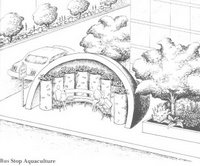
Many of us believe that time is short and that it may even be too late. We have before us two very great problems which, incidentally, have a common solution. The problems: human induced climate change and the peak production of oil. These are problems that have been discussed for many years though little action has been taken to avoid either one. Given the urgency of the situation I’d like to offer up a few thoughts.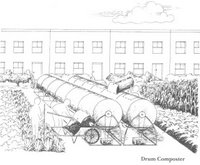
First, let’s stop waiting for corrupt, corporate controlled government to fix it. The recent ineptness of FEMA in New Orleans is just one indicator of government priorities. Let me be clear here, it’s not just the Federal level of government but even state and local. The root problem (in the U.S.) is that we citizens stopped being citizens. We stopped taking responsibility for our lives on every level. Sure, many of us can hold down jobs enough to have some sort of family and to provide that family with some version of the American Dream. But that seems to be the extent of our social responsibility. We’ve left all levels of governance to others and those others do not have our interests in mind. In abandoning our citizenship we’ve abandoned any real claim to meaningful democracy.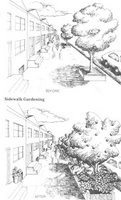
Time for a bit of direct action, eh? What I’d propose here is that we make political parties irrelevant. We fire them because that’s what you do when you are the boss. We need to remember that we employ these people. Next, we need to get busy with the crucial work of rebuilding our culture, our society, and our economy, all from the bottom up. With that I finally get back round to the original purpose of this post which was to advocate the building of an ecological society. An ecological society is not one based on private profit or capitalism for that matter. An ecological society is one which seeks balance within the natural world.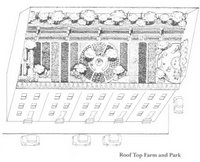
Time for small things. What is proposed here and in many other places is a society that is fundamentally local. Be it rural, city, small town, it is small and intimate because it rests respectfully within the processes of the natural world.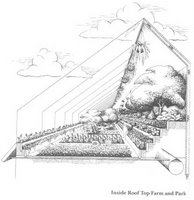
There can be no doubt that an ecological society is totally and completely different from the one we inhabit today. An ecological society is one without Target and Walmart, without mass markets of goods produced in China and sold in the U.S., without 45 minute commutes in SUVs, and without California produce. Such a new ecological society will rely primarily upon local and regional resources which should be processed by local and regional people.
Drawing by Dan O’Leary, based on details of Dian Shatz’s “Visions of Ecotopia” Scanned cover of Murray Bookchin’s Toward an Ecological Society
Other images from Bioshelters, Ocean Arks, City Farming: Ecology as the Basis of Design by Nancy Jack Todd and John Todd
Technorati Tags: Activism, Climate Change, Ecology, Energy Crisis, Hurricane Rita, Katrina, Oil, Peak Oil, Rita, Suburbia